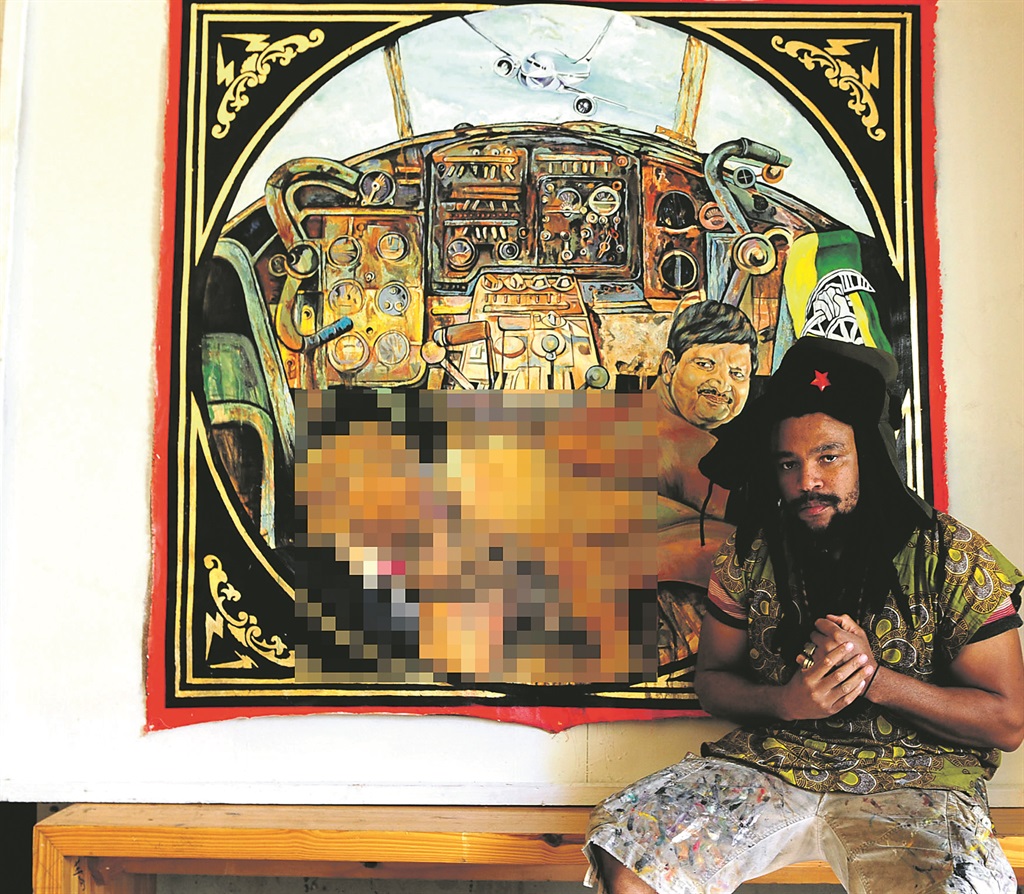
The outspoken artist wants to expose the ‘gangsters’ he believes are ruling the country
During his formative years, controversial artist Ayanda Mabulu watched his surroundings burn as people rejected apartheid rule.
He refused mind-numbing “education” and was beaten up for his insubordination.
He had participated – along with his community – in celebrations when policemen were found dead.
“F**k, I once saw a dog eating a person. It was a dog trained to eat a human beings, but I realised there was a ‘bigger dog’ behind this, it was Ciskei’s [then] prime minister Joshua Gqozo. So I went home and I painted his face on the body of a dog,” he says of his first artwork.
The 35-year-old sits comfortably with one leg propped up on a wooden bench.
His storytelling is as erratic as the freckles that dot his light complexion.
Heavy-looking bongo dreadlocks hang past his shoulders. His once white shorts are covered in splatters of paint.
Continuing to recollect his childhood, he explains how the need to record the blood-letting of black people led him to his art.
He recalls: “There was this newspaper, Imvo Zabantsundu, that was misrepresenting us. It glamorised the idea of a black man dying, dogs licking his blood.
"But it didn’t say anything about the policemen who shot him or the hippo [armoured police vehicle] that rode on top of black bodies.
“So I became interested in having a piece of paper where I could write about the exact nature of my people [suffering] and what drove my people, because no one was saying that.”
“But now I don’t have a printing press, so how do I write this thing?”
This is Mabulu taking us on a journey into his past and describing how his childhood experiences sculpted his thinking and merged with the artistic self that he has grown to be.
Our interview takes place at Constitutional Hill.
Behind Mabulu is a painting of a woman with almost masculine features, naked, save for a white sheet draped over parts of her body.
She holds a finger to her lips and her other hand holds up a gun with a knotted barrel. Pink flowers fill the space around her.
“This is inspired by the Public Protector. We live in a patriarchal society and we are being raised by women.
“It has been inspiring to see a powerful woman who, regardless of whatever criticism, continued to do the right thing.
“I have always been inspired by strong women like my mum and wife. We live in a violent society, where women are objectified.
“I have a daughter and that is not the way I want her to see herself. I want her to be in a position of power. Women don’t always say much, but you see their strength in their deeds.
“For once, I wanted to say [through the portrait of the woman] ‘let’s give them the power and respect they deserve, let’s put them in power where they belong’,” Mabulu says.
But neither this painting nor another of a bleeding black man with animal-like horns on his head – depicting the “dehumanisation of black people who are slaughtered like animals” – are what people are talking about when referring to his work.
When approaching the painting that has caused the storm of the week, Mabulu was distracted by a necklace with a skeleton worn by City Press’ videographer.
He begged her to give it to him, offering to exchange one of his artworks for it.
She pointed to the painting of President Jacob Zuma and Atul Gupta ... “Its fine, take it,” he responds – jokingly.
He then started explaining how the controversial art was created in a calm manner.
“This country is governed by gangsters and the mafia. He – Zuma – is one of those guys.
“We are all passengers on this plane. The pilots – politicians – have been lent power, and that power is ours.
“We are about to crash into another plane and they seem not to care. We are headed for disaster while our leaders engage in activities pleasurable only to them.
“There is panic in the streets and we are confronted with a huge sense of censorship. When we express grievances, a gun is drawn,” he fumes.
“We are dealing with a beast in a black skin. We are gasping for air as black people all the time. We need not to survive, but to live,” he says.
His friend and curator Asanda Madosi shares a joke with us about Mabulu being “a vegan who doesn’t drink or smoke”.
Madosi describes him as a family man.
As we wrap up, Mabulu gives me a serious look and asks in isiXhosa, his home language: “Have you heard me properly, my sister?”
His stern look lingers as if to make sure that I understand.
As elections approach, he urges South Africans to think carefully about where they make their mark.




 Publications
Publications
 Partners
Partners








